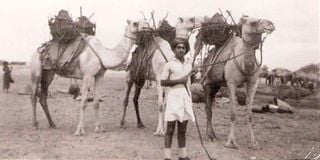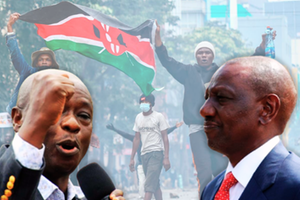Recalling the contrasts of Marsabit region

Mervyn Maciel when he was a government official in Marsabit.
I soon realised that moving from the inferno of Turkana to the mist-covered oasis around Marsabit Mountain was certainly going to be a shock to the system!
I had no intention of leaving Lodwar despite the excessive heat and lonely life. By contrast, though, many of my European and Goan colleagues couldn’t wait to leave once they had completed the ‘unofficial’ period of 18 months in this hot and dusty district.
Unfortunately for me, the staff position in Marsabit was not looking good as one of the clerical staff wanted a move from the area and the Provincial Commissioner decided that I, having served my term in what was an ‘unhealthy’ station, should move out of Turkana and into the cooler climes of Marsabit. Although disappointed initially, I came to accept that this move from a hot and dusty desert to the oasis of Marsabit would be a pleasant change.
I soon realised though, that moving from the inferno of Turkana to the mist-covered oasis around Marsabit Mountain was certainly going to be a shock to the system! Whereas I felt quite comfortable wearing a pair of shorts and a short-sleeved shirt in Lodwar, the cold climate around Marsabit mountain meant that I would need to wear trousers and preferably a tweed jacket and possibly even a jumper.
Warm tweed jacket
I began to feel the cold of Marsabit as soon we entered the mist-covered boma situated on Marsabit mountain and, was glad I had brought a warm tweed jacket with me. This came in handy during the first few days, but as I got acclimatised to the weather later, I was able to manage with just a jumper and a pair of trousers, rarely needing the tweed jacket every day.
Since I have given a more detailed account of my arrival in my memoirs, Bwana Karani (1985), I do not propose repeating it all here. Readers are welcome to access my memoirs — and my second book, ‘From Mtoto to Mzee’— for free at the British Empire website.
Apart from the cold, the warmth with which I was received by the staff and residents alike, convinced me that this was a ‘paradise’ I was going to like. I fell in love with the district and its many different inhabitants. I have given a fairly detailed account of the staff in my recent articles on Daudi Dabasso Wabera and Elisha Godana in The Weekly Review. Marsabit was a large district. While the area where I stayed was cold because of the heavy mountain mists that linger on at times until midday and beyond, a few miles out of the town and you enter a desert. What a contrast!
The European staff consisted of the District Commissioner, Works Supervisor, Superintendent of Police and three Inspectors of Police – all housed in superior-type quarters. The Asian (mostly Goan staff) consisted of the district cashier, district clerk and three police clerks. They were housed in the Asian quarter but their houses were not on par with those allocated to the Europeans. This was the pattern in every district.
The African staff, including Tribal and Kenya Police, were all provided with basic housing. The main traders in the township were mostly Asian (one Goan), including a Hindu tailor, a Sikh carpenter and two Asian transporters. There were two or three African shops including one run by the Somali, Yusuf Sugulle. In addition, there were a couple of butchers. The two I remember were Abdulrehman and Guled Abdi. There was another butcher whose name sadly escapes me now.
Because of the road conditions, especially during the rainy season, a lot of our provisions and also the mail came by air with planes coming over twice a month if I remember rightly. This service was known as the “\Milk Round”. Cut off as we were during the rainy months, we awaited the arrival of the plane carrying out provisions and mail eagerly each time. In my case, this meant a lot as the only way my fiancée in Kitale and I could communicate was through letters, and in an emergency, but at a cost, by telegram! Unlike the hazardous journeys of my days, when we were often held up because of floods, things have improved considerably these days as there is now a tarmac road running all the way to Addis. The Shifta problem, so prevalent when I was in Marsabit, has not gone away despite continued border security. There were Police outposts at Banya Ileret and Sabarei during my days – where a contingent of Kenya Police were stationed.
Courteous and friendly
From what I’ve heard from friends in Marsabit, I would not be able to recognise the place today. In addition to the district office which has been completely modernised, many new buildings have sprung up in the township, including even hotels as many tourists visit the district on their way to the interior areas of North Horr and the lakeside area of Loiyangalani inhabited mostly by the El Molo. I still recall the many trips I made to Loiyangalani after spending a day or two in the oasis of North Horr.
One must remember that because Marsabit is now a gazetted National Park, there is a steady stream of tourists who not only visit the Marsabit Mountain area but even the lakeshore at Loiyangalani and even further into the interior. I have talked earlier of the warm welcome I received from everyone when I first arrived and this in itself meant a lot to me. Everyone I met, be they the office staff, the Tribal Police (known here as ‘Dubas’), the station labour or even the people who came to the office bringing their problems, were always so courteous and friendly. I found this attitude prevailed among the ordinary people in the town and even the traders.
A novelty to me was the fact that we were never short of milk. Staff got their milk supply from a cow that was leased to the government by the owners. I remember having to pay a modest sum to the owner and also a sort of a tip to the government station labourer who collected our supply of milk daily. The good thing is whenever the cow ran ‘dry’, it was immediately replaced. All these arrangements were negotiated with the local Chief Galgallo Duba. I was lucky in that after getting married, my wife Elsie took to the district and the people like a duck to water. We both loved the place and the people and hoped we would stay there for a long time. Unfortunately, we also went through some very difficult times when, our second son, Conrad, was diagnosed with a congenital heart condition which required hospital treatment.
In the absence of such facilities at the local hospital, my wife and Conrad had to be flown out of Marsabit to Nairobi every time he became seriously ill. Despite all this, we very much hoped I would not be moved from Marsabit. Fate decided otherwise, however, and in a few months’ time, I was promoted to a more senior grade – a post in name only with no financial gain and required to move elsewhere.
We were all disappointed by felt that maybe, it would also be in the best interests of our invalid son as there was a well-run hospital in Kisii where I due to be posted. It was a sad day when we had to leave Marsabit, but I am pleased to record that I have kept in touch with friends in Marsabit over the decades, initially through the kind offices of the missionary, Fr Paul Tablino, and more recently through my good friend and well-known historian and writer, Woche Guyo.





